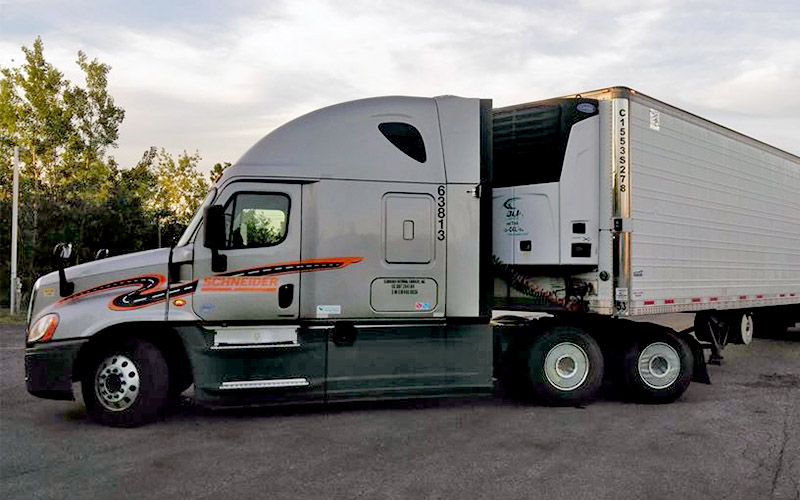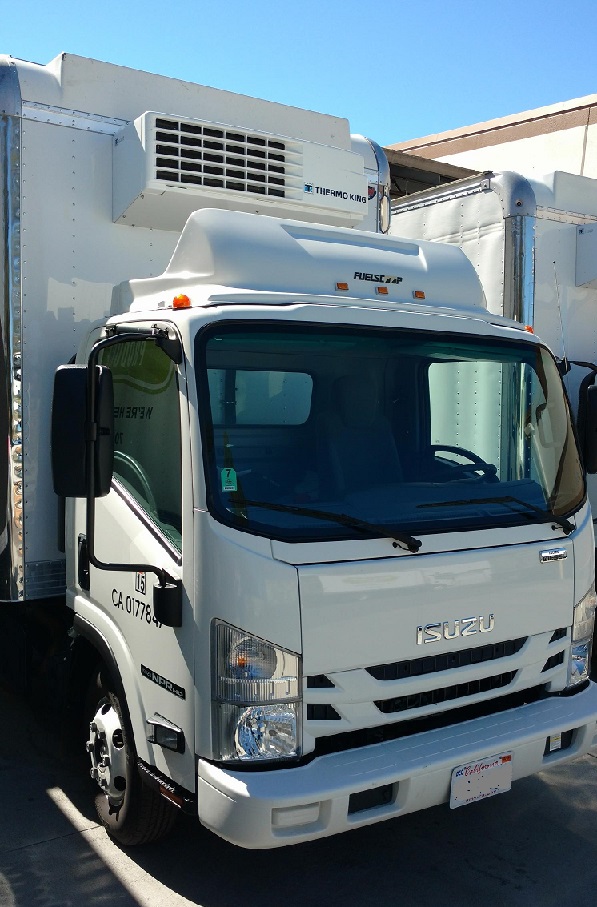Thermo King Truck Refrigeration Units: Best Options for Temperature Control
Thermo King Truck Refrigeration Units: Best Options for Temperature Control
Blog Article
Leading Technologies in Transport Refrigeration: Enhancing Efficiency and Security
The landscape of transportation refrigeration is undergoing considerable improvement, driven by advancements aimed at boosting both effectiveness and safety. As these technologies continue to develop, it is necessary to explore their implications on functional techniques and regulative conformity, motivating a more detailed examination of just how they improve the future of transportation refrigeration.
Smart Temperature Level Monitoring Equipments
In the world of transportation refrigeration, clever temperature monitoring systems have emerged as a critical development for making sure the stability of temperature-sensitive products. These sophisticated systems take advantage of Net of Things (IoT) innovation to give real-time information on temperature fluctuations, enabling operators to keep ideal problems throughout the supply chain. By continuously tracking the temperature of cooled containers and vehicles, companies can quickly determine discrepancies that might endanger item top quality.

Moreover, wise monitoring systems usually incorporate automated alerts and alerts, enabling stakeholders to respond without delay to any type of potential issues. This aggressive technique not only decreases the threat of wasting yet additionally boosts compliance with regulatory standards governing food safety and security and pharmaceutical transport.
The integration of information analytics within these systems also promotes predictive maintenance, helping operators to predict possible tools failures before they take place. This ability minimizes downtime and enhances functional efficiency, inevitably causing cost financial savings.
Eco-Friendly Refrigerants
Smart temperature level monitoring systems play an essential duty in keeping product high quality, however the efficiency of transport refrigeration also hinges on the choice of cooling agents utilized. As ecological issues rise, the change towards environmentally friendly cooling agents has come to be imperative. Typical refrigerants, such as hydrofluorocarbons (HFCs), are infamous for their high Global Warming Possible (GWP), contributing substantially to environment adjustment. On the other hand, arising choices like hydrocarbon-based cooling agents and hydrofluoroolefins (HFOs) existing lower GWP choices, using both efficiency and sustainability.
These eco-friendly refrigerants not just decrease ecological effect yet also align with international regulations focused on terminating harmful materials. Their fostering can lead to boosted energy performance, ultimately reducing operating expense for transport refrigeration systems. Moreover, using natural cooling agents, such as ammonia and co2, has actually acquired grip due to their excellent thermodynamic residential or commercial properties and reduced ecological footprint.
Spending in environment-friendly refrigerants is not merely a governing compliance action; it represents a tactical choice that improves brand name reputation and promotes consumer commitment. thermo king truck refrigeration units. By prioritizing lasting techniques, firms can add to a greener future while making sure the integrity of transported goods
Advanced Insulation Products
Making use of sophisticated insulation materials is critical for maximizing transport refrigeration systems, as they considerably boost power efficiency and maintain regular temperature control. Standard insulation techniques typically drop short in preventing thermal transfer, bring about increased power intake and fluctuating temperatures within cooled compartments.
Arising products such as vacuum cleaner shielded panels (VIPs) and aerogels use superior thermal resistance, permitting thinner accounts without endangering efficiency. VIPs, for example, use a vacuum layer to minimize convective and conductive warm transfer, making them suitable for space-constrained applications. Aerogels, known for their lightweight and permeable structure, offer exceptional insulation while substantially decreasing overall system weight.
Furthermore, integrating stage modification materials (PCMs) right into insulation systems can even more stabilize temperatures during transportation. These products absorb and launch thermal power, successfully buffering against exterior temperature level variants.
The combination of these innovative read this post here insulation products not just minimizes the functional expenses related to energy intake however also extends the life span of temperature-sensitive items. As the transport refrigeration sector remains to advance, the fostering of innovative insulation innovations will certainly be pivotal in boosting both efficiency and safety in chilled transportation.
Automated Course Optimization
The performance of transportation refrigeration systems is greatly boosted via automated path optimization, which leverages sophisticated algorithms and real-time data to determine the most efficient paths for distribution. By analyzing various elements such as traffic patterns, weather condition conditions, and distribution home windows, these systems can dramatically reduce travel time and fuel intake.
Automated course optimization decreases human error and subjective decision-making, which can lead to ineffectiveness. This innovation makes it possible for fleet supervisors to designate sources better, making sure that chilled products maintain their called for temperature level throughout the journey. By maximizing paths, business can likewise enhance client fulfillment via timely shipments.
Moreover, automated systems can adapt to unanticipated scenarios, such as roadway closures or unexpected website traffic spikes, allowing for dynamic rerouting. This flexibility not only shields the integrity of temperature-sensitive products yet additionally contributes to total functional performance.
Applying automated route optimization can lead to substantial price financial savings while lowering the carbon footprint connected with transport. As companies significantly prioritize sustainability, this development sticks out as a crucial element in modern-day transportation refrigeration, lining up operational goals with ecological obligation. Inevitably, automated course optimization stands for a considerable improvement in the quest for performance and safety in transport refrigeration.

Real-Time Information Analytics
Automated course optimization significantly gain from the integration of real-time data analytics, which supplies important understandings into the see here now performance of transport refrigeration systems. By using real-time information, transport operators can keep an eye on temperature fluctuations and tools performance, making sure that perishable products are maintained within called for parameters throughout transit. This proactive technique not just boosts the quality of the transported items yet additionally minimizes the threat of perishing and loss.

Along with improving effectiveness, real-time analytics boosts security by making sure compliance with regulative criteria for temperature control. This not only shields public health however likewise strengthens a firm's online reputation - thermo king transport refrigeration. As the transport refrigeration sector develops, the assimilation of real-time information analytics arises as a keystone for driving development, sustainability, and functional quality
Conclusion
In conclusion, the innovations in transportation refrigeration substantially enhance both effectiveness and safety within the market. Collectively, these technologies represent a critical evolution in transport refrigeration, making sure conformity with governing requirements and advertising a greener future.
The landscape of transport refrigeration is undergoing substantial transformation, driven by innovations intended at improving both effectiveness and safety.Smart temperature level surveillance systems play a crucial role in preserving item top quality, however the efficiency of transportation refrigeration likewise pivots on the option of refrigerants made use of. Their fostering can lead to improved energy performance, inevitably lowering operating costs for transportation refrigeration systems. Eventually, automated course optimization represents a substantial advancement in the quest for performance and security in transport refrigeration.
In conclusion, the innovations in transport refrigeration dramatically improve both efficiency and safety and security within the sector.
Report this page